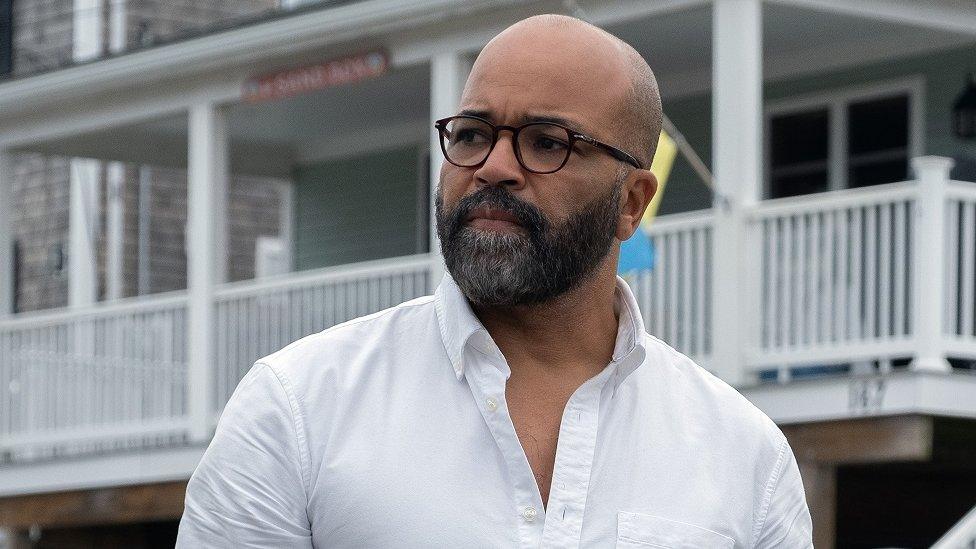American Fiction director says white audiences are too comfortable with black clichés
- Published

Jeffrey Wright plays author Monk in American Fiction
American Fiction isn't your average piece of cinema entertainment.
Sharp and incisive, it's a satire that aims savage barbs at modern culture.
It's the story of an author, Monk, played by Jeffrey Wright, who becomes disillusioned with the way the publishers he wants to work with only seem interested in stereotypical black storytelling.
In frustration, he pens a book overflowing with black clichés. To his dismay, it becomes an instant literary hit.
American Fiction's writer and director Cord Jefferson sees it as satire, but with a serious message.
"I just wanted to find a way to invite people in," he says. "Allowing them to laugh, and enjoy themselves, and not feel like they're lectured, not feel like they're being scolded, not feel like they're being told how to believe.
"And to maybe laugh at themselves, maybe feel a little bit uncomfortable, maybe cringe a little bit."
Black storytelling
The film is based on the book Erasure by Percival Everett. When he first read it, Jefferson found that many of the themes strongly reflected his own experiences.
When he was a journalist, he found that people were coming to him and suggesting he write about negative racial incidents.
"When I got into film and TV, I thought I was going to escape that," he remembers. "And then I realised that people would ask me, 'Do you want to write about this slave, do you want to write about this drug dealer, do you want write about this gang member?'
"And I realised that these kind of rigid restrictions as to what black life looked like were being placed on me even in the world of fiction, which blew my mind.
"When I read Erasure by Percival Everett, I immediately recognised that the things he was talking about in the book were the things that I had been thinking about for decades of my life."

Cord Jefferson on the set of American Fiction
In American Fiction, the author Monk finds himself increasingly frustrated at the way the audiences only want to read stories from black writers that conform to negative stereotypes.
It's something Jefferson believes that the film world is equally guilty of.
"What Hollywood is really comfortable with is rehashing past successes. It's not just slavery movies or inner city poverty movies. We see the way they rehash and reboot, and there are sequels and prequels.
"That said, when you tell these kind of binary stories of blackness, when you tell these stories about slavery, and the civil right era, what it allows white audience members to do is to say, this depiction of race does not harm my self image because I'm not burning a cross on anybody's lawn, I don't own slaves, I'm not a racist."
But is that fair on audiences who have embraced and supported films that have shone a light on racial injustice in the past?
"Those kind of stories continue to put white characters at the centre of the film," says Jefferson. "You can't have most slavery movies without the white slave owners, and the slavers themselves.
"I have no idea exactly why, but I think that those are a couple of reasons why those stories might continue to be retold over and over and over again.
"It's just more comfortable storytelling for people."

American Fiction is seen as big contender for best picture at the Oscars
Diversity of storytelling in the film industry, and how to improve it, is complex subject.
"I think it's more [to do] with the studio," says Amon Warmann, a writer with an interest in black film and TV. "That's where these things get greenlit - the people who have the power to say no to certain stories and to say yes to certain stories."
But Warmann also believes things are moving in the right direction.
"In the wider scheme of things, we are getting better. I just saw [the 2023 remake of] The Color Purple. And yes, that story does have elements of struggle and trauma and all the rest of it. But there's a lot of light and love in that film."
It's certainly true that over the past few years, films like Marvel's Black Panther have been heralded as breakthrough movies.
"We have got better in recent years about telling stories that are black-led on camera and behind the camera," Warmann agrees. "But it's still at a stage where any time that happens, the word 'fresh' or 'unique' or something to that effect is coined to it because it's not something that we see very often.
"I've spoken to black storytellers I know, they have plenty of other stories to tell beside just the racial angle to it and the negative angles of that.
"But when it comes to getting the funding and getting the amount of support they need to bring that vision to fruition, there are either several hoops that they have to go through, or they're just not able to go through those hoops."
Oscar hopes
It's a situation that mirrors the experiences of Monk in American Fiction, who can't interest publishers in his book about ancient Greek history.
And that in turn it mirrors Jefferson's experience of trying to get this film made.
The writer and director says: "95% of the people who saw the material said they didn't want to make the movie, said they worked at a place where they couldn't get it made.
"It was essentially, they didn't have the will to make it. They had the money, of course. This isn't an expensive movie to make. But they just didn't have the will."
Hollywood is, of course, overflowing with stories of missed opportunities and retrospective regret.
Undoubtedly, some of those who passed on American Fiction are now looking on with envy as it gathers awards momentum.
It won the top prize at the Toronto International Film Festival in September. Over the last 15 years, only one film that has taken that accolade has failed to get a best picture nomination at the Academy Awards.
Several have gone on to win the Oscar, including Slumdog Millionaire, The King's Speech and 12 Years A Slave.
American Fiction will be in cinemas on 2 February 2024.